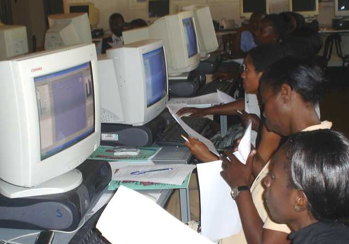I had the opportunity to visit Abuja and Lagos when SchoolNet Nigeria was created in September 2001. In contrast to the world's attention on violence in New York City and elsewhere during those difficult days, the Nigerian event was an optimistic one as several ministries touted the benefits of technology to enhance teaching and learning in the country. The heads of these ministries spoke eloquently of the value of the Internet and the sponsoring iEARN global network to provide access to information and to global student-to-student interaction--all in the pursuit of 21st century skills.
So, it is painful to hear of the horrors that Nigerian school children and their families face daily in simply having access to a quality education -- much less one that is enhanced through technology and global connections.
A year ago, I joined the outcry to "Bring our girls home" when over 200 young girls were kidnapped in northern Nigeria by Boko Haram death squads and presumably forced into sexual slavery. Surely, I thought, the Nigerian government, bolstered by offers of technical and military assistance from around the shocked world, would act in the name of justice and humanity to rescue them and bring the perpetrators to justice.
And yet, in January 2015, the kidnapped schoolgirls have not been rescued and the atrocities continue as thousands are killed and villages ravaged by these same murderous thugs--seemly with impunity. One cannot imagine the physical and psychological damage that these girls have endured in their captivation. Currently, Nigeria is home to the largest number of out-of-school young people and undoubtedly also home to the largest number of students under constant threat of abduction or murder--simply for attempting to receive an education.
The world rightfully condemns the murder of 12 individuals in France who were murdered because of their political thoughts. Indeed, we are all Charlie and stand firm against such an atrocity.
Yet, we must also be Nigeria and demonstrate the same outrage and condemnation when individuals in Nigeria, Syria and elsewhere, many of them children, become the innocent victims of conflict and/or crazed and violent murderers. Perhaps we are numbed by the sheer numbers of victims and level of atrocities. Perhaps we are immune to such suffering in parts of the world where our media share nothing but negative images. We simply cannot care less for lives in some continents than others.
We must also speak out for resources from our own government. I was encouraged that several Members of Congress, led by Representative Frederica Wilson (D-FL) spoke out against the Chibok atrocity. Yet in 2014 the US Agency for International Development (USAID) spent less than 3 percent of its aid budget for Nigeria on education and less than 1 percent on peace and security. Access to safe and secure learning centers needs to be at the forefront of our assistance to a country in which it is dangerous for young girls and boys to attempt to gain an education.
The Global Campaign for Education-U.S. calls upon colleagues working to achieve education for all the world's youth to come together to say in a loud and demanding voice that the U.S. government and the international community cannot let this tragedy continue for another day of trauma or lost life. Where there is Nigerian government recalcitrance or reluctance to act, we must be vocal, insistent, supportive and demanding of action.
Nigeria must not be a place of "business as usual" as long as boys and girls are not free to exercise their human right to an education.